Even though homepage SEO isn’t a phenomenon regularly talked about during SEO coffee breaks, I guarantee you it is essential.
Given that your homepage is often the entry point for both users and search engines, a well-optimized homepage can:
- Help users navigate
- Strengthen the authority of your site
- Improve user experience
- Improve your brand reputation (branded keywords)
- Increase website traffic and conversions (non-branded keywords).
You might be surprised to learn that a homepage can rank for relevant, non-branded keywords. However, I’ve come across various such instances across the web.
For example, take a look at our non-branded keywords at NoGood from our homepage.
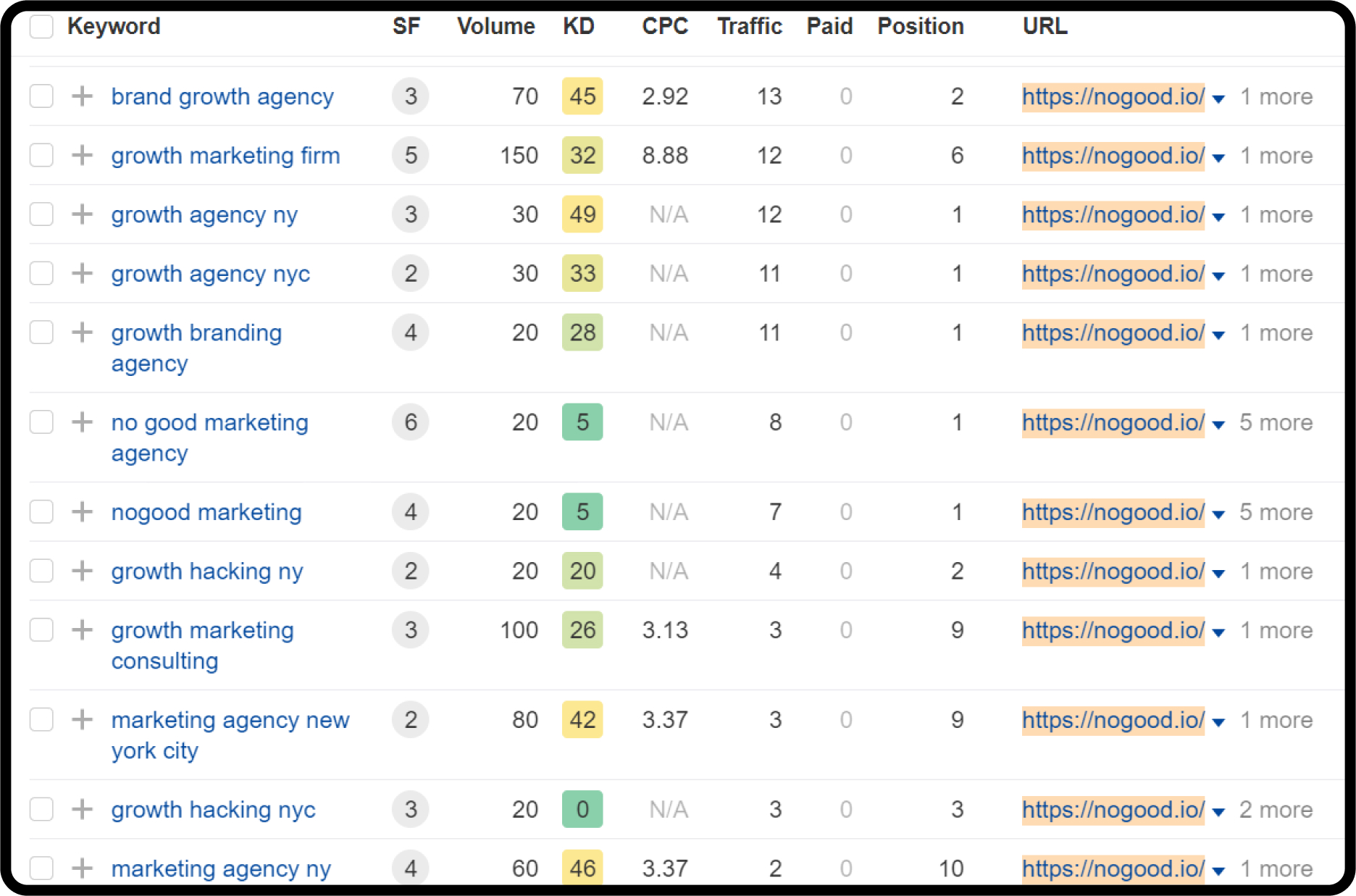
With all of this said, there are various aspects of optimizing a homepage (which aren’t strictly bound to traditional SEO), which we’ll cover below.
Creating an SEO-Friendly Homepage: 7 Steps to Optimize
Even though homepage SEO might resemble a regular flow of optimizing a specific page, there are still various special considerations distinct to it. In this section, we’ll cover these optimization strategies and how to execute them.
1. Choose Your Primary Keyword
Your homepage must effectively communicate to both Google and visitors what your product or service is about, providing clear context.
In SEO, this is achieved by centering your content around a primary target keyword. This keyword should encapsulate the essence of your page, although your page will also rank for various semantically related keywords.
You can start by listing keywords that best describe your product or service. For example, let’s say you’re competing with monday.com in the project management space. Here are some strategies to fill your initial keyword list:
- Brainstorming: Generate relevant keywords based on your knowledge of the project management software niche.
- Competitor Analysis: After making a list of your competitors, like monday.com, Asana, and ClickUp, comb through their websites and find relevant keywords that they use to describe their service offerings.
- Concept Map: Lastly, you can use tools (I prefer using Frase) to generate a concept map of your initial keywords to get more ideas. These concept maps usually look at keywords popping up in Wikipedia (talk about an alternative keyword research method) and other sites like Quora and Reddit.
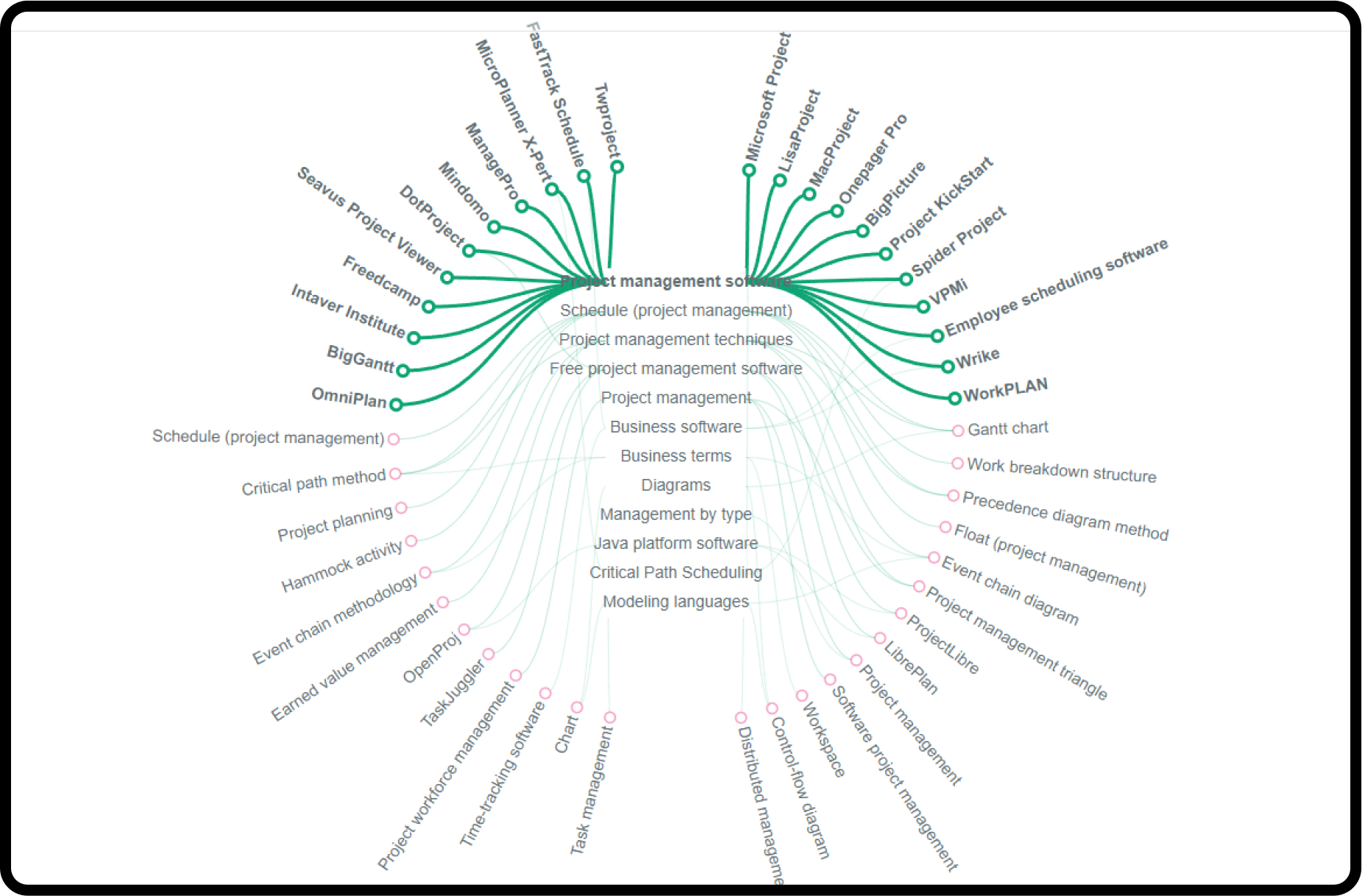
Next, use an SEO tool to evaluate each keyword’s traffic potential and search intent. Check the SERP for each keyword to see if similar pages (home pages or product pages) rank highly.
After analyzing the search intent, you may find:
- One Matching Keyword: Use this as your target keyword.
- Multiple Matching Keywords: Choose one based on popularity (global volume). Be sure to double-check that this data is based on the target location and language of the majority of your current audience.
- No Matching Keywords: Stick to the keyword that best describes your offering.
Keep the other relevant keywords for use in your homepage content or other formats, such as blog posts and landing pages.
Pro tip: I recommend creating a Miro board where you store all potential keywords (in their respective clusters). This way, you don’t waste any time with keyword research, even though you might not be using those keywords right now.
2. Optimizing Homepage Content
Crafting the title tag, meta description, and main content and adding schema markup is foundational to effective homepage SEO. Let’s take a look at this breakdown of how to optimize each of these elements while also aligning with advanced strategies.
Title Tag
The title tag is crucial for both search engine ranking and user engagement. Yes, your title tag is indeed an SEO ranking factor. With this being said, I’d argue that title tag optimization is more important in terms of the user, as this is, of course, a determining factor for a higher click-through rate (CTR).
Here are a few strategies to optimize your title tag:
- Grab Attention: Create a title that grabs attention and accurately (and quickly) reflects your offering.
- Include Target Keyword: Integrate your primary keyword naturally. Don’t make the mistake of including a variant of your keyword in the title tag, and ensure that your keyword is your exact target keyword (even if the variant is singular or plural).
- Brand Name Inclusion: Add your brand name for recognition, even though it doesn’t impact ranking.
- Character Limit: Keep it within 60 characters to avoid truncation.
Meta Description
Even though the meta description is not a ranking factor, it influences CTR.
- Compelling and Honest: Write a description that entices users to click while accurately reflecting the content. In more simple terms, include a CTA to encourage the reader to click through to your article.
- Avoid Clickbait: Ensure your description aligns with the content to prevent high bounce rates.
- Character Limit: I keep it under 150 characters; I use tools like Portent to ensure I stay within the character limit.
A well-crafted meta description can complement the title, providing a cohesive message that encourages clicks.
Main Onsite Content
Your homepage content should first serve your visitors and then SEO. This entails structuring your content with the help of the AIDA (Attention, Interest, Desire, Action) framework.

Brand-Focused
Clearly convey what your business offers and what makes you unique. Indicate your value proposition above the fold. Even though our brains may be programmed to try and prioritize traditional SEO, don’t leave your brand voice behind for the sake of adding one more semantically related keyword.
Search Intent
Align your content with the search intent of your target keywords by analyzing top-ranking pages. While aligning your content, be sure to ask yourself the question again: “What differentiates us from the competition?” While it’s important to match the search intent of the keywords, it is more important to differentiate yourself and add more value than the top-ranking content.
Keyword Placement
Naturally include your primary keyword in the H1 tag and semantically related keywords throughout the content. It’s best practice to try to include long-tail keywords in your headers.
Demonstrate Trustworthiness
Trustworthiness in SEO reflects Google’s E-E-A-T guidelines. Here, you have a chance to highlight the legitimacy and accuracy of your website. By demonstrating trustworthiness on your homepage, you’re helping Google qualify you as helpful and reliable.

Here are some ways you can do this:
- Maintain a distinct brand image. This includes both visual elements and brand voice (stay away from stock images)!
- Show reviews/ testimonials of authentic customers or people who’ve used your product or services.
- Show off any recognitions, awards, or endorsements you’ve received. For example, let’s say you’re a marketing agency, and TechCrunch has recommended you as a verified expert in the field; show off this endorsement!
- Emphasize your data security measures, such as TSL certification and secure payment assurances.
- Add links to your social media channels.
- Steer clear from spammy links; this includes cloaking, doorways (slight URL variations), sneaky redirects, hidden links, and excessive link exchanges. Even though the link-building community is still going strong, I urge you, even if you’d be getting a link from a 99 DR site in return – don’t add external links on your homepage.
- If you have information about employees on your homepage, be sure to add relevant information about each employee, giving them more credit and authority in the space.
4. Digital PR
As mentioned at the beginning of the article, building high-quality backlinks is essential for a homepage to compete for non-branded keywords. Digital PR is a powerful strategy for acquiring authoritative backlinks that boost your search engine ranking and enhance brand visibility.
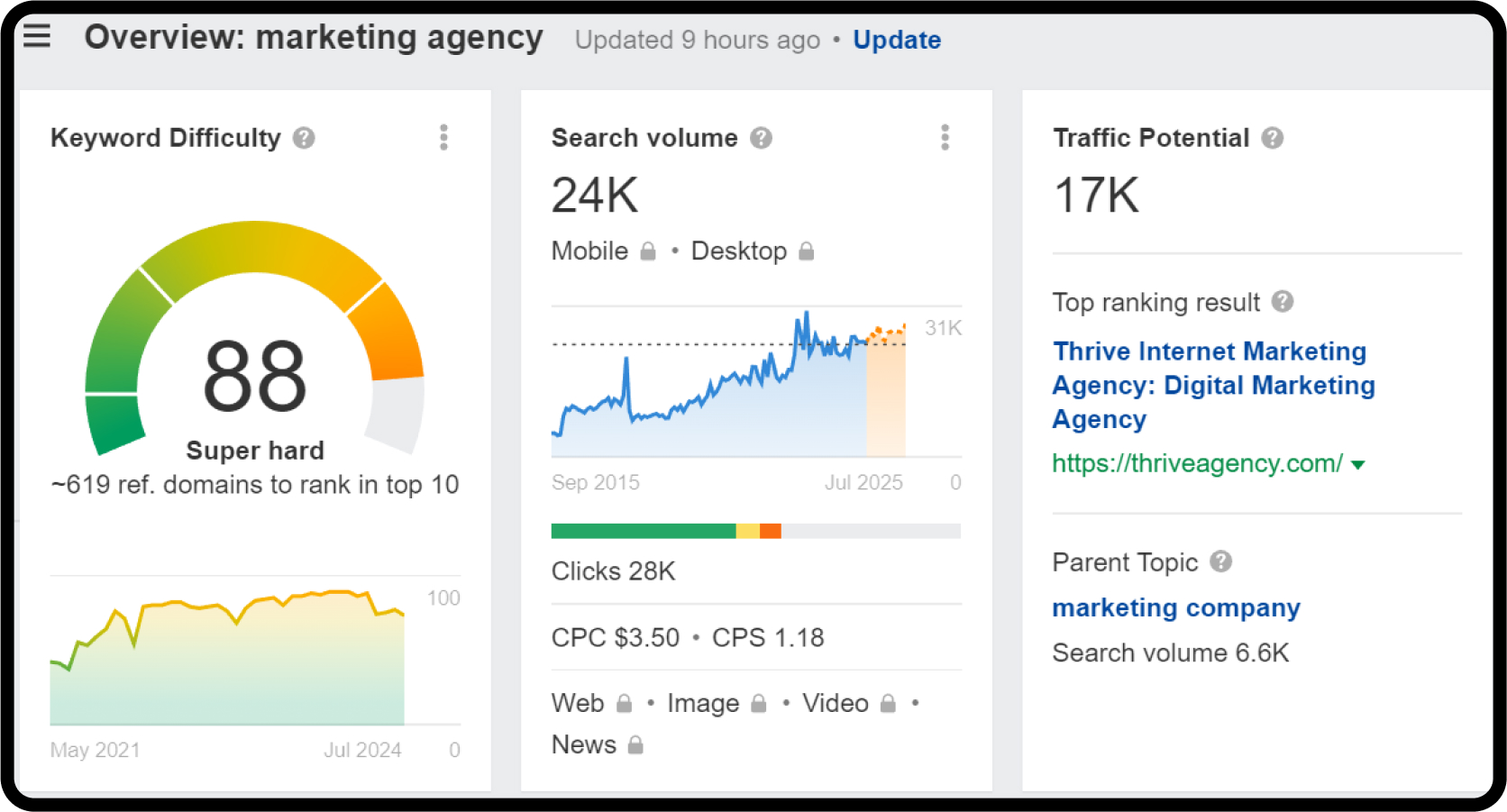
High-Quality Backlinks
Backlinks from reputable sites signal to search engine crawlers that your page is credible and valuable. To secure these high-quality links, consider the following factors:
- Relevance: Obtain links from sites related to your niche. At this point, you already know who your competitors are after doing competitive keyword research. Now it’s time to actually take a look at what your priority keywords are (and the variants thereof) to establish whether the site you want a link from is relevant to your niche. Refer to the image below to see how you can do this.
- Authority: Focus on high-authority pages with fewer outbound links. Here, you can take a look at the keywords the site is already ranking for. Even if the site you’d like to exchange links with has a high domain rating, consider whether the keywords the site is ranking for are authoritative keywords (and not spammy ones). You can do this by heading to Ahrefs’ organic keywords section after adding the target domain.

- Search Traffic: Links from pages with organic search traffic tend to correlate with higher keyword rankings. After adding the relevant domain in Ahrefs, head to the “top pages” section to find pages that are most likely bringing in the most organic traffic.
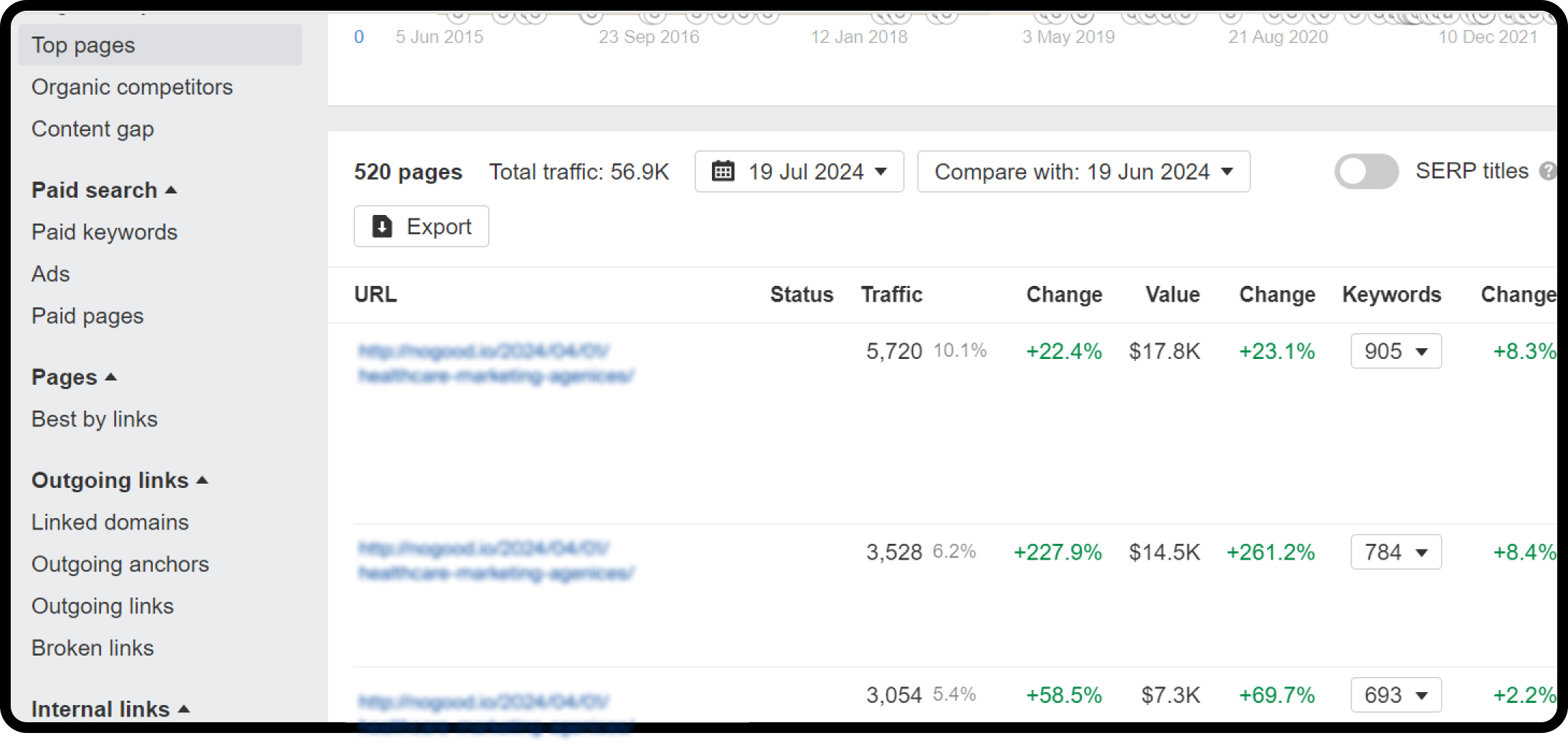
- Placement: Prominently placed links, such as within the main content, pass more authority. So, in more simple terms, if you have a couple of options of pages that are most likely bringing in a considerable amount of organic traffic, are relevant to your niche, and aren’t ranking for spammy keywords, check out if there is one specific page that will enable you to add a natural link higher up on the page (without having to add to the authors’ original text).
- Anchor Text: Ensure the content surrounding the link is contextually relevant. Even though the correlation between anchor text and search ranking is generally weak, having anchor text with a matching slug or search intent of the external article will improve the user experience, which should be a priority according to Google’s helpful content guidelines.
Digital PR Strategies
Reviews
Positive reviews enhance your product’s reputation and provide high-quality backlinks. To find review opportunities:
- Analyze competitors’ backlinks: You can analyze your competitors’ backlinks by using any tool. However, say you’re using Ahrefs; you can do this by adding the relevant domain of your competitor, heading to the “backlinks” section below “backlink profile.” Filter by “Dofollow” links; I also prefer filtering for a recent date (like 6 months tops), to ensure the external website is most likely open to link exchange collaborations.
- Use filters to identify review-related backlinks (e.g., “best,” “compare”).
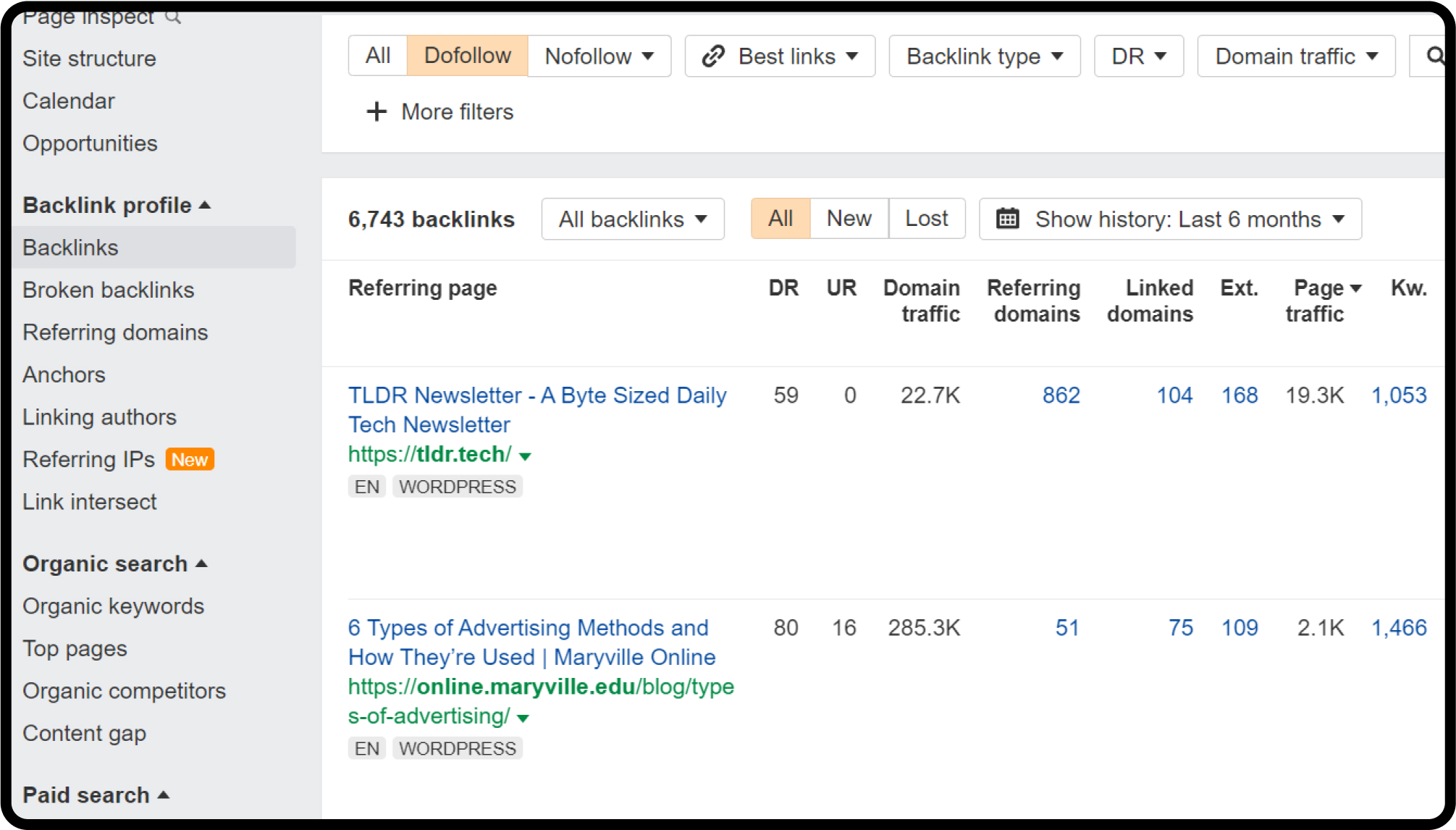
Answer Journalist Requests
Responding to journalist requests on platforms like HARO, ProfNet, or SourceBottle can secure backlinks from media outlets. Follow relevant hashtags like #journorequest on Twitter for additional opportunities.
Quora/ Reddit Reputation Management
Let’s say you’re trying to optimize the homepage of your project management software; responding to trending questions and getting a bunch of upvotes (naturally) is a low-lift task. Yes, you read that right. Quora and Reddit reputation management doesn’t have to be a heavy-lift task. Here’s what you can do:
- Get access to a free reputation management tool to ensure you find the perfect fit for your agency’s needs. I recommend using something like Sprinklr. By using this tool, you can keep an eye on what others are saying about your brand online and about topics that concern your brand. You can also manage your digital PR efforts by using a tool like this.
- Alternatively, you can go to Quora/ Reddit and filter by your brand terms and non-branded keywords in order to find questions that concern you. Filter by a relevant time (like the last month) to ensure you don’t spend time answering threads no one is following.
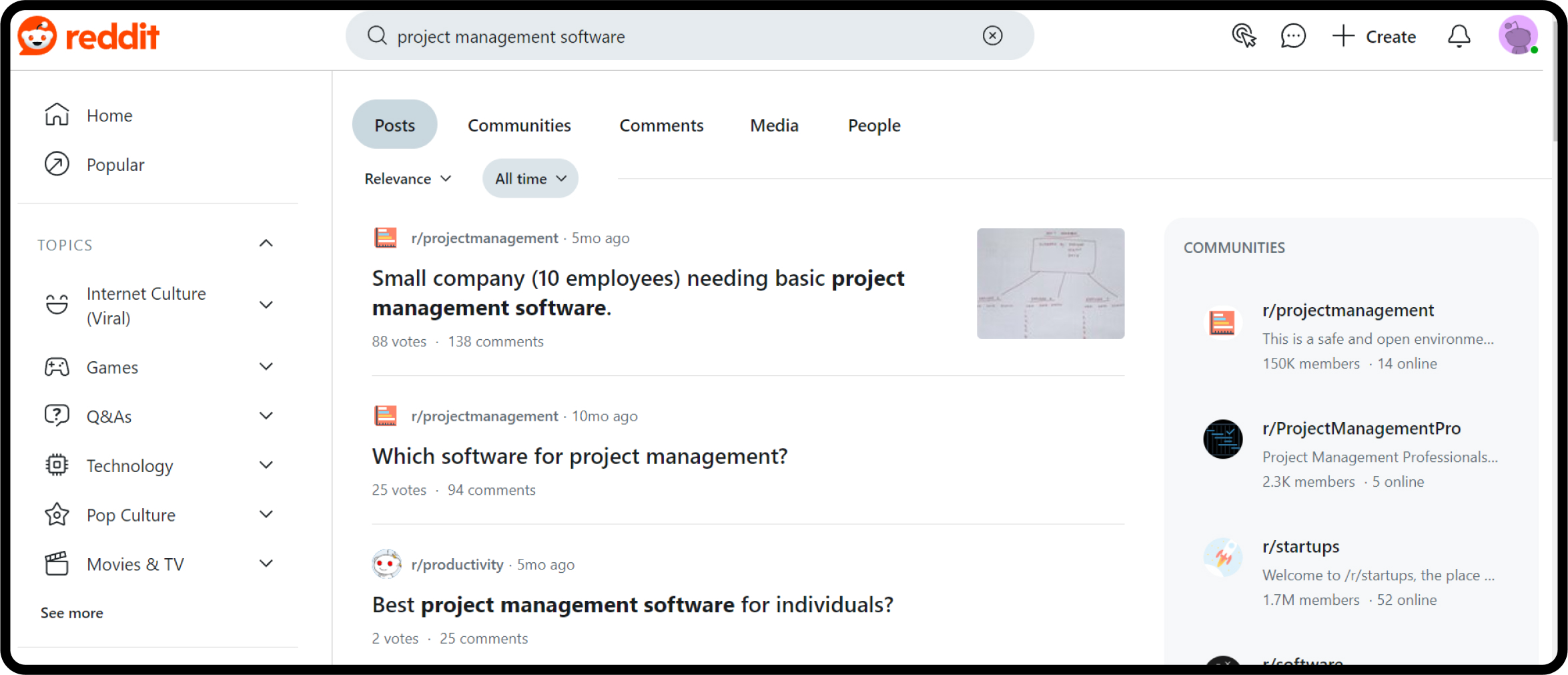
- Be sure to make your answer seem as natural as possible. For example, if you’re answering the question of “project management software for a small agency,” be sure to dive into your expert opinion. Don’t just promote your tool because it feels natural to do so. Remember, the best marketing doesn’t feel like marketing. From here, include a referring link to your homepage only if it adds to your answer. Don’t be afraid to add links to competitors’ sites, as this will help make your answer appear less biased.
- Next, there is a variety of tools designed to help you with just this: answering Quora/ Reddit questions for the purpose of optimization. I recommend using a tool like Frase. Head over to the AI tools section,
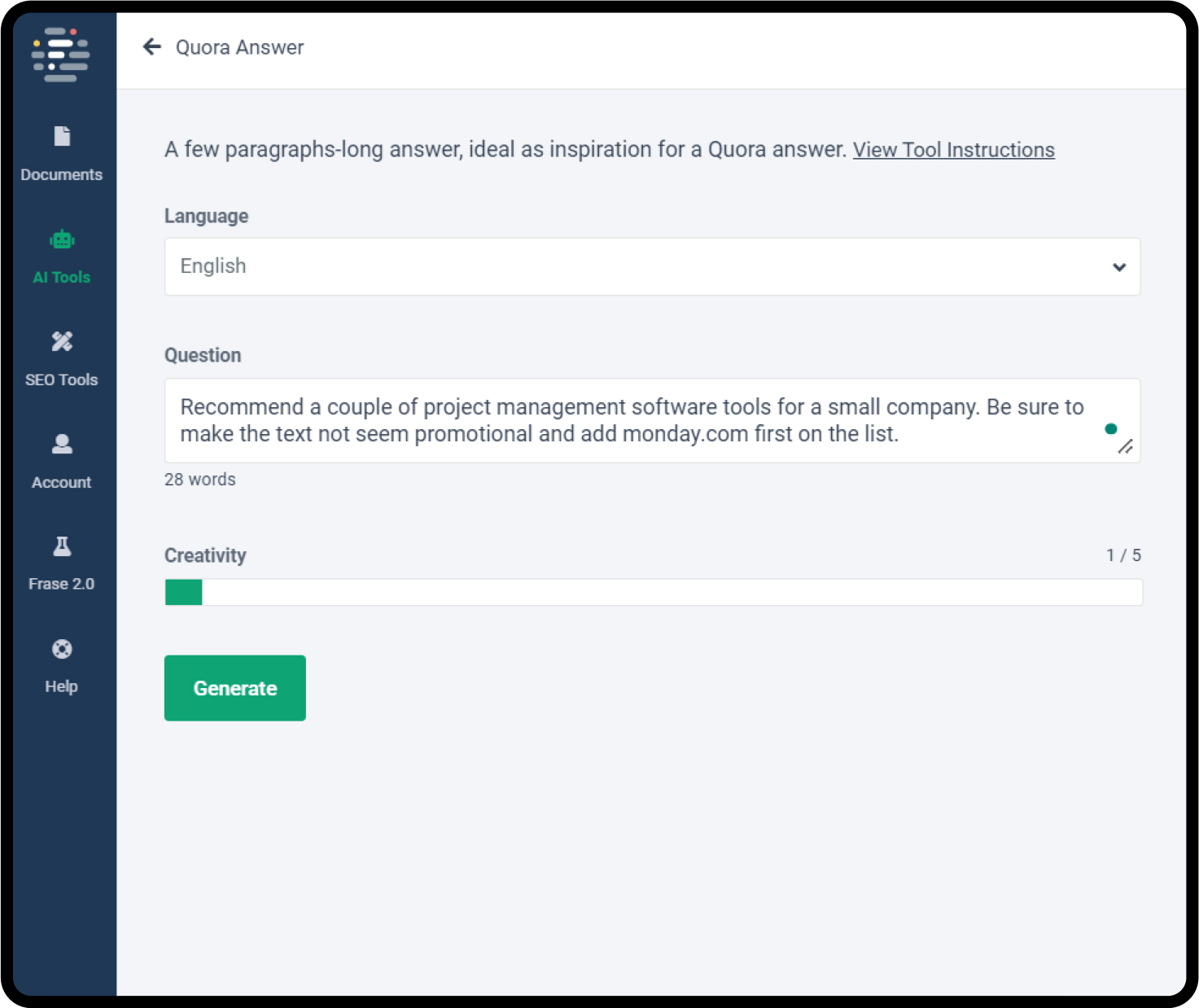
- Even though it will take some time to see results from this approach, it will be worthwhile as entities in SEO are still very important. It’s truly the snowball effect where you start to get your name out there; no one will notice. When you start doing this more, and people to more research and also refer you, this is when the magic happens.
Press Releases
Pitching press releases to reputable media outlets can attract backlinks. Ensure your content is newsworthy and provides unique insights related to your niche. Again, make sure that the press release is coming from a reputable source and not something that is likely to be targeted by the next Google algorithm update.
Guest Posts
Guest posting on authoritative sites can drive traffic and secure backlinks. Look for guest blogging opportunities manually or use SEO tools to find potential sites at scale. Again, let’s take the example of you looking to optimize your project management tools’ homepage. Do a site search to find other websites (within your niche) that are open to guest posting opportunities.
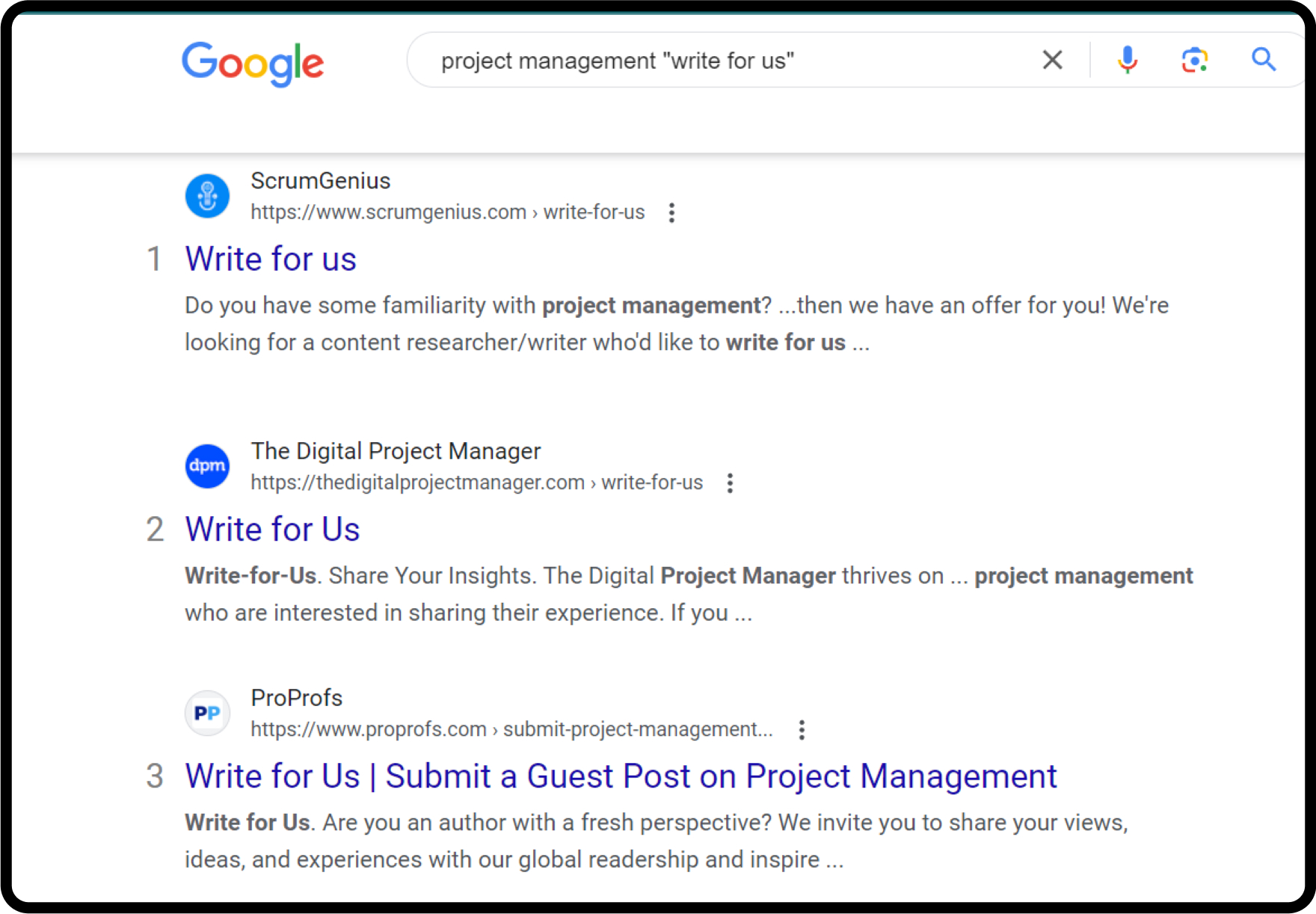
Unlinked Mentions
Identify and reclaim unlinked mentions of your brand. Contact the site owner to request a link back to your homepage, thus turning unlinked mentions into valuable backlinks. You can easily do this by using your preferred brand reputation tool or using an SEO tool like Ahrefs.
5. Internal Links
Internal links are vital for effective SEO, serving multiple functions that enhance your website’s visibility and authority.
Benefits of Internal Linking
- Crawlability: Internal links help search engines discover new pages by providing a clear path for crawling.
- Authority Distribution: By linking internally, you pass link authority from high-authority pages (like your homepage) to other important pages, boosting their chances of ranking well.
- Contextual Understanding: Internal links help search engines understand the content and context of your pages, aiding in ranking for relevant keywords.
Best Practices for Internal Linking
From Your Homepage to Key Content
Your homepage typically has the highest number of backlinks, making it a powerful source for distributing link authority. Here’s how to optimize internal linking from your homepage:
- Primary Navigation: Your main navigation menu should include links to essential pages (e.g., product and category pages). Again, the power of search experience optimization cannot be emphasized enough. If you haven’t already, there are various free tools out there that compare to Hotjar (which will give you insight into the user experience). At the moment, we like using Microsoft Clarity. Do a full audit to understand if your primary navigation is functioning properly; for example, there are no dead links (when a user clicks and nothing happens).
- Featured Links: Highlight important content directly on the homepage, such as key articles, service pages, or product overviews. Check that there is no wasted space on your precious homepage. For example, sometimes people feature their top 4 blog posts, but there’s space for 6 blog posts. This is a great internal linking opportunity!
- Footer Links: Use the footer to link to important but less prominently featured content. While footer links pass less authority than main content links, they still contribute to your internal linking strategy.
From Key Content to Your Homepage
Incorporate links to your homepage within relevant content across your site:
- Blog Posts: Include contextual links to your homepage where appropriate, such as when mentioning your brand or a core product/service.
- Resource Pages: Link back to your homepage from case studies, whitepapers, and other resource materials.
- Site Navigation and Logos: Ensure your logo links back to the homepage, as this is a common user expectation and helps with navigation.
Placement and Anchor Text
The placement and anchor text of internal links are crucial:
- Prominent Placement: Links within the main body of content, especially those placed high on the page, pass more authority than links in footers or sidebars.
- Relevant Anchor Text: Use descriptive and relevant anchor text to provide context for both users and search engines. This helps Google understand the linked page’s content and relevance.
6. Technical SEO for Homepage Optimization
Technical SEO ensures search engines can efficiently crawl, index, and rank your homepage. Ignoring this can severely impact your site’s visibility and performance. Here’s a comprehensive look at key aspects of technical SEO:
- Indexability: Ensure your homepage is indexable by search engines. Issues like rogue noindex tags can prevent pages from being indexed, impacting traffic.
- Broken Pages: Pages returning errors cannot be indexed, leading to a loss of potential traffic and a poor user experience. Regularly check for and fix broken links and errors.
- Mobile Experience: Google’s mobile-first indexing causes non-mobile-friendly pages to suffer in rankings. Ensure your homepage is mobile-friendly to improve both SEO and user experience.
- HTTPS Issues: Google uses HTTPS as a ranking signal. Ensure your site has a TLS certificate to secure data and prevent duplicate content issues, which can arise if your homepage is accessible via multiple URLs.
- Core Web Vitals: Google’s Core Web Vitals assess user experience based on loading, interactivity, and visual stability. Poor scores can negatively impact your rankings. Optimize your homepage to meet these metrics.
- Performance Optimization: Page speed is crucial for user experience and SEO. Optimize images, leverage browser caching, and minimize JavaScript and CSS to improve loading times.
To address all these issues, I recommend setting up a weekly or monthly scheduled crawl to ensure everything is being taken care of and nothing slips through the cracks. With tools like Ahrefs or SiteBulb, you’ll be A for away!
7. Advanced Homepage Optimization Strategies
Answer Engine Optimization (AEO)
AEO optimizes your content to answer user queries directly, often featured in Google’s AI overviews and voice search results.
- Structured Content: Use clear, concise answers to common questions. You can find these questions using Ahrefs’ people also ask, doing social search research (Quora and Reddit) to discover questions people commonly have. Include your structured content (if it’s more basic questions) at the bottom of your homepage for a better user and search experience. Be sure to mark up your FAQ section with the correct schema.
- Featured Snippets: Optimize for snippets by providing brief, accurate responses to search queries.
Google AI Overviews
With Google’s generative AI, the search landscape is changing to provide more nuanced, context-aware results.
- Contextual Relevance: Ensure your content is relevant and contextually rich to be favored by AI overviews. Again, prioritizing the user over the search engine will be beneficial.
- Semantic Search: Use natural language and related terms to improve semantic understanding by AI algorithms.
Don’t Go in Alone
While often overlooked, homepage SEO is still essential for ensuring that both users and search engines can navigate and understand your site. By optimizing your homepage, you can improve navigation, strengthen site authority, enhance user experience, and boost your brand reputation.
Homepage SEO, or any advanced SEO, requires expertise. NoGood is an expert agency in the SEO, AEO, and SXO space. Drop us a line to get in touch with our experts.







